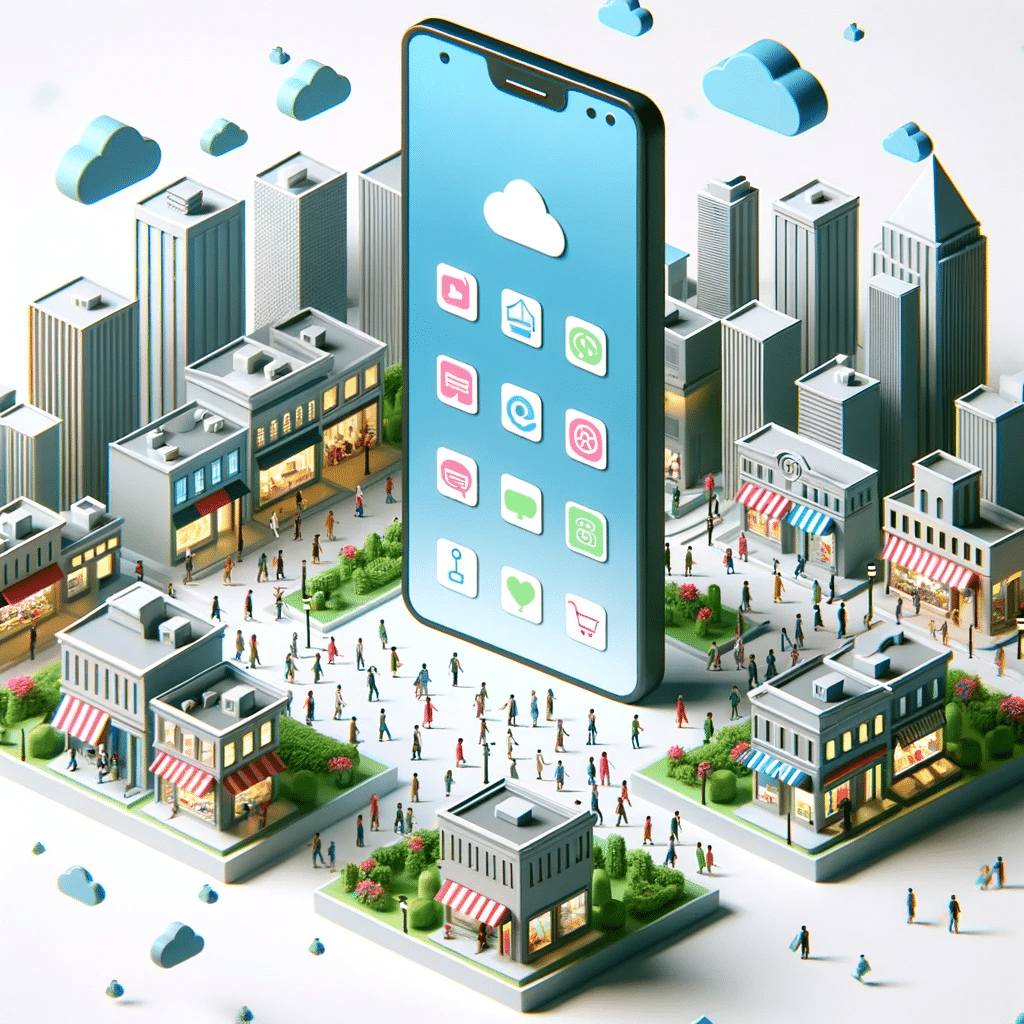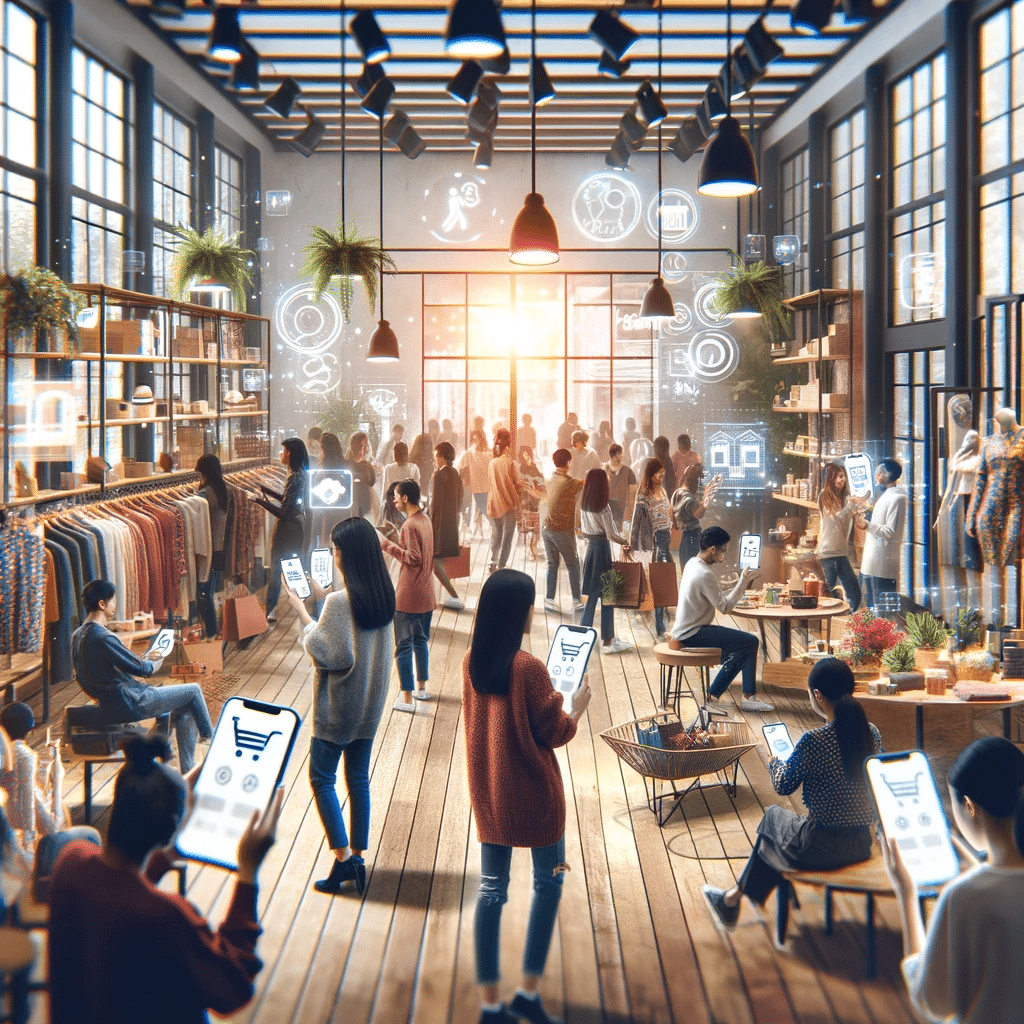Retail Transformation: In today’s retail scene, all eyes are on the change brought about by retail mobile apps. They go beyond just helping you buy stuff – these apps are like the conductors of a retail orchestra, reshaping how customers experience shopping.
They make things personal, offering a smooth blend of both online and in-store shopping. By doing this, retail mobile apps create a shopping journey that’s not just what you expect, but even better. They’re not just tools; they’re changing how we shop and bringing customers and stores closer together.


Key Takeaways
- Retail transformation requires strategic visioning and innovative technologies.
- Personalizing the app experience based on user preferences is crucial for engagement.
- Dynamic growth in retail involves expanding products, reaching global markets, and forming strategic partnerships.
- Enhanced customer experiences are achieved through a dedicated specialist and automation.
- Leveraging innovative technologies and custom software development ensures future-ready retail.
Ready to Transform? Contact Summer Digital for Tailored Retail Solutions.
Components of Retail Transformation
In the dynamic landscape of modern retail, driven by innovation, the orchestration of retail transformation unveils a symphony.
This composition is intricately woven with the harmonious interplay of custom applications, customer-centric strategies, and innovative technologies.
As we navigate this transformative journey in the retail sector, let’s delve into the foundational elements that define and shape this evolution.
- Strategic Retail Visioning: Crafting a future-oriented vision to steer the transformation journey.
- Innovative Retail Technologies: Integrating cutting-edge technologies into retail operations.
- Agile Business Processes: Adopting flexible and adaptive processes to respond to market changes.
Custom Applications in Retail Transformation
Custom applications are pivotal in the orchestration of retail transformation. As digital architects, they meticulously shape the retail landscape to align with strategic objectives, enhancing customer experiences and ensuring adaptability to industry trends.
These applications provide businesses with a competitive edge, fostering agility in the face of evolving market dynamics. As retailers navigate transformation, the implementation of custom applications becomes a cornerstone, enabling them to orchestrate a seamless and personalized retail experience.
| Feature | Functionality |
| Personalized Customer Journeys | Tailoring experiences based on individual preferences |
| Real-time Customer Engagement | Facilitating immediate and meaningful interactions |
| Data-Driven Decision Making | Utilizing insights for informed strategic decisions |
App Personalization: Crafting Memorable Interactions
At the heart of retail transformation lies app personalization, a key element in crafting personalized masterpieces for customers. Through the brushstroke of custom application development, routine transactions transform into memorable interactions, resonating with individual preferences and fostering customer engagement.
Elements of App Personalization
- User Preferences: Adapting the app interface and content based on individual user behaviors.
- Tailored Recommendations: Offering personalized product suggestions and promotions.
- Interactive Features: Incorporating interactive elements for a unique and engaging experience.
Customer Engagement Metrics
In decoding the language of user interactions, customer engagement metrics become a guiding compass. These metrics, such as user interaction rates, conversion rates, and retention rates, showcase the effectiveness of app personalization efforts.
They paint a vivid picture of customer engagement, guiding businesses in refining and optimizing the app experience to foster lasting connections with their audience.
| Metric | Measurement |
| User Interaction Rates | Tracking clicks, swipes, and other interactive actions |
| Conversion Rates | Monitoring the percentage of users making purchases |
| Retention Rates | Assessing the number of users returning to the app |
Dynamic Growth Through Retail Mobile Apps
To achieve dynamic growth, businesses must embrace the transformative power of retail mobile apps. These apps are not mere tools; they embody retail transformation, propelling sales, enhancing customer experiences, and setting the stage for a future marked by prosperity.

Strategies for Dynamic Growth:
- Expanding Product Offerings: Diversifying the range of products or services available on the mobile app.
- Global Market Expansion: Targeting international audiences through localized app experiences.
- Strategic Partnerships: Collaborating with other businesses to enhance app functionality and reach.
Metrics for Measuring Growth
Measuring growth in retail mobile apps involves a strategic blend of quantitative indicators and qualitative assessments.
| Metric | Measurement |
| Revenue Growth | Evaluating the increase in sales and overall revenue |
| User Base Expansion | Tracking the growth in the number of app users |
| Market Share Increase | Assessing the app’s share of the overall market |
These growth metrics offer businesses a comprehensive understanding of their app’s success and areas that may require strategic attention.
Elevate Your Retail Experience: Partner with Summer Digital for Custom App Development and Software Solutions!
Get Free Consultation
Customer Experience Specialist: Guiding the Symphony
In the era of retail transformation, businesses need a customer experience specialist to guide them through the intricate notes of customer experience automation.
This specialist acts as the maestro, ensuring that every interaction facilitated by custom applications harmonizes seamlessly, leaving a lasting and positive impression.
Responsibilities of a Customer Experience Specialist:
- User Journey Optimization: Analyzing and refining the customer’s journey through the app.
- Feedback Management: Gathering and implementing user feedback to enhance the app experience.
- Continuous Improvement: Staying updated on industry trends to incorporate the latest features and technologies.
Impact of Customer Experience Automation:
The impact of customer experience automation resonates deeply in customer satisfaction and brand loyalty.
By streamlining and automating touchpoints within the customer journey, businesses achieve a consistent and high-quality experience.
| Benefit | Impact |
| Increased Customer Satisfaction | Positive feedback and improved overall customer sentiment |
| Higher User Retention Rates | More users returning to the app for repeated interactions |
| Enhanced Brand Loyalty | Building long-term relationships with satisfied customers |
Innovative Technology in Custom Application Development
Innovative technology is at the heart of retail transformation. Custom application development becomes the vehicle through which businesses embrace and leverage the latest technological advancements, delivering seamless, futuristic retail experiences that captivate and engage customers.
Cutting-Edge Technologies in Retail Apps:
- Artificial Intelligence (AI): Implementing AI for personalized recommendations and predictive analytics.
- Augmented Reality (AR): Enhancing the shopping experience with AR features like virtual try-ons.
- Blockchain Technology: Ensuring secure and transparent transactions within the app.
Technological Integration Framework:
Within the technological integration framework, a harmonious symphony of cutting-edge tools and platforms comes to life. The strategic integration of technologies such as AI, AR, and blockchain creates an enriched and immersive retail app experience.
This integration elevates the user experience and positions the retail app at the forefront of technological innovation, enhancing its competitive edge in the market.
| Technology | Integration in Retail Apps |
| Artificial Intelligence | Personalized shopping recommendations and predictive features |
| Augmented Reality | Virtual try-on experiences and interactive product showcases |
| Blockchain Technology | Secure and transparent transaction processing |
Developing Custom Software for Future-Ready Retail
The art of developing custom software is the cornerstone of future-ready retail. It is the sculpting of digital solutions that align with the retail vision, ensuring businesses not only keep up with trends but actively shape and define them.
Stages of Custom Software Development:
- Needs Assessment: Identifying the unique requirements and challenges of the retail business.
- Design and Prototyping: Creating a blueprint and interactive prototype of the custom software.
- Agile Development: Iteratively developing and refining the software based on feedback and evolving needs.
Benefits of Future-Ready Custom Software:
The benefits of future-ready custom software extend far beyond immediate functionality.
| Benefit | Impact |
| Scalability and Flexibility | Adapting to changing business demands and growth |
| Enhanced Efficiency and Productivity | Streamlining operations and improving workflows |
| Seamless Integration with New Technologies | Keeping the software up-to-date with emerging trends |
The Essence of Retail Transformation: Custom Applications
In the symphony of retail transformation, custom applications are the soulful essence. They are more than solutions; they are the tangible commitment of a business to stay ahead, adapt to change, and craft a unique path in the ever-evolving retail landscape.

Components of Retail Transformation Essence:
- Customer-Centric Design: Placing the customer at the forefront of app development.
- Agile Development Methodology: Embracing flexibility and adaptability in software creation.
- Continuous Innovation: Integrating new features and technologies to stay ahead of the curve.
Measuring the Impact:
Measuring the impact of retail transformation through custom applications involves a multi-faceted evaluation.
- User satisfaction, derived from feedback and overall sentiment, is a qualitative measure reflecting the app’s success in meeting customer expectations.
- Time-to-market, assessing the speed of introducing new features, is a quantitative metric gauging the app’s agility.
- Competitive advantage highlights its ability to differentiate and attract users.
Unveiling the Future: Retail Visioning with Custom Apps
As we unveil the future of retail, it’s clear that retail visioning and custom apps are inseparable. Businesses that prioritize retail transformation through strategic visioning and custom application development are the conductors poised to lead the orchestra of the future.
Future-Focused Retail Visioning:
- Anticipating Technological Trends: Staying ahead by forecasting emerging technologies.
- Adapting to Changing Consumer Behaviors: Aligning the app with evolving customer preferences.
- Sustainable Practices: Integrating eco-friendly and socially responsible features into the app.
Role of Custom Apps in Shaping the Future:
As custom applications shape the future of retail, their influence extends beyond immediate functionalities. These digital conduits not only optimize current operations but also pioneer technological trends and industry standards.
The future of retail is a transformational journey towards innovation, adaptability, and sustainability.
| Contribution | Impact |
| Pioneering Technological Trends | Setting industry standards with innovative features |
| Adaptable Customer-Centric Design | Meeting evolving customer expectations and needs |
| Sustainable Retail Practices | Demonstrating corporate responsibility and ethics |
Conclusion
In conclusion, the symphony of retail transformation resonates through the interplay of custom applications, customer-centric strategies, and cutting-edge technologies. Businesses, navigating both the challenges of the present and the possibilities of the future, find in custom applications a digital architect crafting personalized and adaptable retail experiences.
This transformative journey, guided by strategic visioning and enriched by insights from customer engagement metrics and the impact of automation, propels businesses toward sustained success.
As the retail sector evolves, the crescendo of growth becomes a harmonious composition reflecting the vast potential of retail transformation—a future woven with threads of innovation, customer-centricity, and a steadfast commitment to sustainability.
Frequently Asked Questions (FAQs):
-
Why Is App Personalization Essential In Retail Transformation?
App personalization tailors the user experience, fostering engagement and loyalty through adapted interfaces and tailored recommendations.
-
How Can Summer Digital’s Customized Software Solutions Enhance My Retail Business Operations?
Summer Digital’s customized software solutions can significantly enhance your retail business operations by optimizing efficiency, improving customer experience, and enabling digital transformation, essentially giving you an edge in today’s competitive retail market.
-
What Strategies Drive Dynamic Growth In Retail Mobile Apps?
Dynamic growth involves expanding products, global market reach, and forming strategic partnerships for increased revenue and market standing.
-
What Is the Typical Timeline for Developing a Retail Mobile App With Summer Digital?
The timeline for developing a retail mobile app with Summer Digital varies based on project complexity and specific requirements. Each project is unique, hence requires individual assessment, but they are committed to delivering timely results.
-
How Does Custom App Development Ensure Future-Ready Retail?
Custom apps provide scalability, efficiency, and alignment with trends, ensuring businesses stay adaptable and competitive




